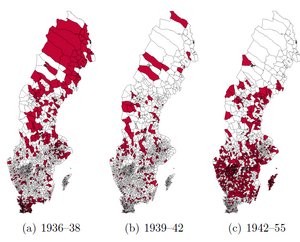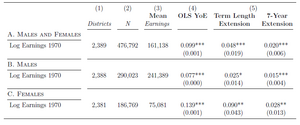Education, Health and Labour Market Outcomes
Education, Health and Labour Market Outcomes
Governments around the world recognise the importance of education for its impact on the development of individuals and the societies in which they live, and invest large shares of their budgets in education. Given the considerable costs of education, it is of great importance to evaluate whether and how education improves living conditions. There is a long tradition in economics of analysing the effect of education on labour market outcomes (Griliches, 1977). One frequently used method to estimate the causal effect of human capital on earnings are policies (e.g. compulsory schooling laws) extending the mandatory amount of education. Becker (1962) added the further dimension of seeing education as an important determinant of non-market outcomes. However, causal analysis -- which is essential for policy makers that consider different reform options -- is a challenging task, since there is reverse causation running from health to education, and confounding third factors which may affect both health and education (Currie, 2009).
Research:
All of the papers in this project utilise Swedish data to answer different research questions regarding the link between education, health and labour market outcomes. The cohorts born in Sweden in the 1930s and 1940s were affected by several reforms of the educational system. Exploiting regional and temporal variation in the implementation of these reforms (see e.g. Figure 1) we can thus estimate causal effects of increased schooling. Furthermore, we digitised standardised exam catalogues containing individual information on marks and sickness absence in each school year for a sample of pupils. The catalogues were gathered from historical archives in Sweden and can e.g. be used to estimate the short- and long-term effects of student absence (c.f. Cattan et al., 2017).
Figure 1: Timing of Term Length Extension (Fischer et al., 2017).
In another research project we evaluate the impact on earnings, pensions, and further labor market outcomes of two parallel educational reforms increasing instructional time in Swedish primary school. The reforms extended the annual term length and compulsory schooling by comparable amounts and data allows us to follow the cohorts over an exceptionally long time period. Implemented in the first half of the twentieth century when a large majority of all Swedes only completed primary education, the reforms raised human capital on a large scale.
Using purposively collected reform data excerpted from exam catalogues and high-quality register data, we find striking differences in the effects of the two reforms: at 5%, the returns to the term length extension were at least half as high as OLS returns to education and benefited broad ranges of the population. The compulsory schooling extension had small (2%) albeit significant effects, which were possibly driven by an increase in post-compulsory schooling. Both reforms led to increased sorting into occupations with heavy reliance on basic skills.
Table 1: Main Results: 1970 Earnings (Fischer et al., 2017).
Publications and working papers:
Fischer, Martin & Karlsson, Martin & Nilsson, Therese & Schwarz, Nina, 2017. The long-term effects of long terms: Compulsory schooling reforms in Sweden, Ruhr Economic Papers 733, RWI - Leibniz-Institut für Wirtschaftsforschung, Ruhr-University Bochum, TU Dortmund University, University of Duisburg-Essen. Working Paper
Cattan, Sarah & Kamhöfer, Daniel A. & Karlsson, Martin & Nilsson, Therese, 2017. The Short- and Long-Term Effects of Student Absence: Evidence from Sweden. IZA Discussion Papers 10995, Institute for the Study of Labor (IZA). Working Paper
Fischer, Martin & Karlsson, Martin & Nilsson, Therese, 2013. Effects of Compulsory Schooling on Mortality – Evidence from Sweden. International journal of environmental research and public health, 10(8), 3596-3618. Working Paper
References:
Becker, G. (1962). Investment in Human Capital: A Theoretical Analysis. Journal of Political Economy 70, 9.
Currie, J. (2009). Healthy, Wealthy, and Wise: Socioeconomic Status, Poor Health in Childhood, and Human Capital Development. Journal of Economic Literature 47(1), 87–122.
Griliches, Z. (1977). Estimating the Returns to Schooling: Some Econometric Problems. Econometrica 45(1), 1–22.


